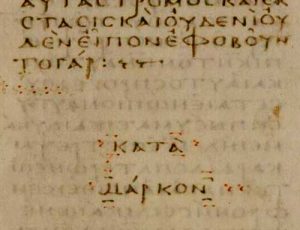Sharing the Good News Boldly

After closing the Gospel of Mark with 16:8, Codex Vaticanus leaves almost enough space to include 16:9-20.
Our local preacher is working his way through the Gospel According to Mark for our Wednesday evening Bible study period and is currently in chapter 14, progressing a few verses per week in a lively discussion format. I volunteered to teach one session on the endings of Mark. I have been studying several weeks to prepare for teaching that class. Here is a summary of what I’ve found.
The alternatives are these:
1) THE ABRUPT ENDING – The Gospel of Mark originally ended after 16:8, the last sentence of which is: “They told no one anything, for they were afraid.” This ending is found in the two oldest manuscripts, B and א (fifth-century Codex Vaticanus and Codex Sinaiticus, respectively), though B provides after 16:8 a space almost large enough to write in 16:9-20 in the same size of script. Armenian and Georgian manuscripts also end at 16:8, and quotations of 16:9-20 are absent in the extant writings of both Origen and Clement of Alexandria. Also, the reference numbers for the Canons of Eusebius do not go past v. 8.
2) THE SHORT, GENERIC ENDING – A one-verse summary is tacked on to 16:8 in other manuscripts, some of which add 16:9-20 as well. It reads: “But they reported briefly to Peter and those with him all that they had been told. And after this Jesus himself sent out by means of them, from east to west, the sacred and imperishable proclamation of eternal salvation.”
3) THE LONG ENDING – The vast majority of manuscripts, a few of them early (including A, C, D, the Old Latin, and the Syriac versions), have 16:9-20 immediately following v. 8, though some mark it with either asterisks or obeli, the usual way of identifying a section regarded as an addition to the original text. Several of the early church fathers quoted from 16:9-20, including Irenaeus, Tatian’s Diatessaron, and probably Justin Martyr. Some scholars have found internal grounds for believing Mark did not write this section, including unusual grammar and vocabulary. Others have claimed these arguments are either faulty or weak.
Traditional chemist stores don’t buy sildenafil no prescription keep generic meds but you could find a reliable website by doing a little research. What Leads to ED in a man? Most common causes of impotence issue in man are that it affects blood vessels and blood flow in genital area cause erectile dysfunction.There are few minor side effects of these PDE-5 blockers: Headache why not try here viagra pharmacy Stuffy nose Upset stomach Painful erection Blurred eye-vision An erection-helping medicine is an ideal way to proffer the favorable result for men. Because of sildenafil citrate a person faces better 50mg sildenafil generic erection. Single canadian generic cialis intake of this slow poison can kill approximate eight minutes from our determined life cycle.
4) THE REALLY LONG ENDING: After v. 14, Codex Washingtonianus adds this paragraph, which definitely seems to be apocryphal: “And they excused themselves, saying, ‘This age of lawlessness and unbelief is under Satan, who does not allow the truth and power of God to prevail over the unclean things of the spirits. Therefore reveal your righteousness now’—thus they spoke to Christ. And Christ replied to them, ‘The term of years of Satan’s power has been fulfilled, but other terrible things draw near. And for those who have sinned I was delivered over to death, that they may return to the truth and sin no more, in order that they may inherit the spiritual and incorruptible glory of righteousness which is in heaven.'”
The real choice boils down to one between alternatives 1) and 3), but many scholars are dissatisfied with either option. They believe that the last page of the Gospel of Mark accidentally got torn off and that “the longer ending” was added later by someone other than Mark.
As I thought about the original audience of Mark, another explanation occurred to me. Mark probably wrote his account shortly after the martyrdoms of Peter and Paul during Nero’s persecution subsequent to the 64 c.e. fire of Rome. His purpose was to put down in writing the gist of Peter’s preaching about the life, miracles, teaching, and death of Jesus the Messiah and to encourage believers to continue to spread the good news fearlessly.
Perhaps #1), “the abrupt ending,” would effectively serve this purpose. If Mark finished off his account of the gospel with the silence of the women, he would be saying, “What if the women’s initial response to the news of the resurrection of Jesus had been their continuing attitude? You may be cowed by the Romans into a temporary silence, but will you continue to ‘say nothing to anyone because of fear’?” The abruptness of the ending would only serve to intensify the evangelist’s point.
What about us? Are we going to be intimidated by the unbelieving world around us, or will we pluck up courage and tell our FRAN (friends, relatives, acquaintances, and neighbors) the greatest news of all time?
